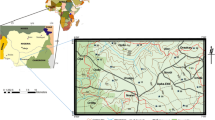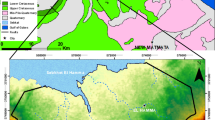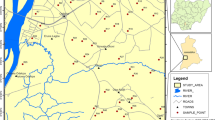Abstract
An integrated method that implements multivariate statistical analysis and ML methods to evaluate groundwater quality of the shallow aquifers of the Djerid and Kebili district, Southern Tunisia, was adopted. An evaluation of their suitability for irrigation and/or drinking purposes is necessary. A comprehensive hydrochemical assessment of 52 samples with entropy weighted water quality index (EWQI) was also proposed. Eleven water parameters were calculated to ascertain the potential use of those resources in irrigation and drinking. Multivariate analysis showed two main components with Dim1 (variance = 62.3%) and Dim.2 (variance = 22%), due to the bicarbonate, dissolution, and evaporation and the intrusion of drainage water. The evaluation of water quality has been carried out using EWQI model. The calculated EWQI for the Djerid and Kebili waters (i.e., 52 samples) varied between 7.5 and 152.62, indicating a range of 145.12. A mean of 79.12 was lower than the median (88.47). From the calculation of EWQI, only 14 samples are not suitable for irrigation because of their poor to extremely poor quality (26.92%). The bivariate plot showed high correlation for EWQI ~ TH (r = 0.93), EWQI ~ SAR(r = 0.87), indicating that water quality depended on those parameters. Different ML algorithms were successfully applied for the water quality classification. Our results indicated high prediction accuracy (SVM > LDA > ANN > kNN) and perfect classification for kNN, LDA and Naive Bayes. For the purposes of developing the prediction models, the dataset was divided into two groups: training (80%) and testing (20%). To evaluate the models’ performance, RMSE, MSE, MAE and R2 metrics were used. kNN (R2 = 0.9359, MAE = 6.49, MSE = 79.00) and LDA (accuracy = 97.56%; kappa = 96.21%) achieved high accuracy. Moreover, linear regression indicated high correlation for both training (R2 = 0.9727) and testing data (0.9890). This well confirmed the validity of LDA algorithm in predicting water quality. Cross validation showed a high accuracy (92.31%), high sensitivity (89.47%) and high specificity (95%). These findings are fundamentally important for an integrated water resource management in a larger context of sustainable development of the Kebili district.













Similar content being viewed by others
Data availability
Data are available upon request.
References
Abuzir SY, Abuzir YS (2022) Machine learning for water quality classification. Water Qual Res J. 57:152–164. https://doi.org/10.2166/wqrj.2022.004
Adnan RM, Dai HL, Kuriqi A, Kisi O, Zounemat-Kermani M (2023) Improving drought modeling based on new heuristic machine learning methods. Ain Shams Eng J. https://doi.org/10.1016/j.asej.2023.102168
Ahmed U, Mumtaz R, Anwar H, Mumtaz S, Qamar AM (2020) Water quality monitoring: From conventional to emerging technologies. Water Supply. 20:28–45. https://doi.org/10.2166/ws.2019.144
Al-Mukhtar M (2021) Modeling the monthly pan evaporation rates using artificial intelligence methods: A case study in Iraq. Environ Earth Sci. 80:1–14. https://doi.org/10.1007/s12665-020-09337-0
Aouiti S, Hamzaoui Azaza F, El Melki F, Hamdi M, Celico F, Zammouri M (2021) Groundwater quality assessment for different uses using various water quality indices in semi-arid region of central Tunisia. Environ Sci Pollut Res. 28:46669–46691. https://doi.org/10.1007/s11356-020-11149-5
Bashar AM, Nozari H, Marofi S, Mohamadi M, Ahadiiman A (2023) Investigation of factors affecting rural drinking water consumption using intelligent hybrid models. Water Sci Eng. 16:175–183. https://doi.org/10.1016/J.WSE.2022.12.002
Behzad M, Asghari K, Eazi M, Palhang M (2009) Generalization performance of support vector machines and neural networks in runoff modeling. Expert Syst Appl. 36:7624–7629. https://doi.org/10.1016/J.ESWA.2008.09.053
Benkhaira S, Layeb A (2020) Face recognition using RLDA method based on mutated cuckoo search algorithm to extract optimal features. Int J Appl Metaheuristic Comput. 11:118–133. https://doi.org/10.4018/IJAMC.2020040106
Besser H, Hamed Y (2019) Causes and risk evaluation of oil and brine contamination in the Lower Cretaceous Continental Intercalaire aquifer in the Kebili region of southern Tunisia using chemical fingerprinting techniques. Environ Pollut. 253:412–423. https://doi.org/10.1016/j.envpol.2019.07.020
Besser H, Dhaouadi L, Hadji R, Hamed Y, Jemmali H (2021) Ecologic and economic perspectives for sustainable irrigated agriculture under arid climate conditions: An analysis based on environmental indicators for southern Tunisia. J Afr Earth Sci. 177:104134. https://doi.org/10.1016/j.jafrearsci.2021.104134
Bharani Baanu B, Jinesh Babu KS (2022) Smart water grid: A review and a suggestion for water quality monitoring. Water Supply. 22:1434–1444. https://doi.org/10.2166/ws.2021.342
Bradbury MH, Baeyens B (2009) Sorption modelling on illite Part I: titration measurements and the sorption of Ni, Co, Eu and Sn. Geochim Cosmochim Acta. 73:990–1003. https://doi.org/10.1016/j.gca.2008.11.017
Çakir M, Yilmaz M, Oral MA, Kazanci HÖ, Oral O (2023) Accuracy assessment of RFerns, NB, SVM, and kNN machine learning classifiers in aquaculture. J King Saud Univ Sci. 35:102754. https://doi.org/10.1016/J.JKSUS.2023.102754
Che Nordin NF, Mohd NS, Koting S, Ismail Z, Sherif M, El-Shafie A (2021) Groundwater quality forecasting modelling using artificial intelligence: A review. Groundw Sustain Dev. 14:100643. https://doi.org/10.1016/j.gsd.2021.100643
Dassi L (2011) Investigation by multivariate analysis of groundwater composition in a multilayer aquifer system from North Africa: A multi-tracer approach. Appl Geochem. 26:1386–1398. https://doi.org/10.1016/j.apgeochem.2011.05.012
Dhaouadi L, Besser H, Wassar F, Kharbout N, Brahim NB, Wahba MA, Kang YK (2020) Agriculture sustainability in arid lands of southern Tunisia: Ecological impacts of irrigation water quality and human practices. Irrig Drain. 69:974–996. https://doi.org/10.1002/ird.2492
Dhaouadi L, Besser H, karbout, N., Wassar, F., Alomrane, A.R. (2021) Assessment of natural resources in tunisian Oases: Degradation of irrigation water quality and continued overexploitation of groundwater. EuroMediterr J Environ Integr. 6:1–13. https://doi.org/10.1007/s41207-020-00234-3
Dhaouadi L, Besser H, Karbout N, Khaldi R, Haj-Amor Z, Maachia S, Ouassar F (2022) Environmental sensitivity and risk assessment in the Saharan Tunisian oasis agro-systems using the deepest water table source for irrigation: water quality and land management impacts. Environ Dev Sustain. https://doi.org/10.1007/s10668-021-01878-z
Gaaloul N (2011) Water resources and management in Tunisia. Int J Water. 6:92–116. https://doi.org/10.1504/IJW.2011.043319
Georgescu PL, Moldovanu S, Iticescu C, Calmuc M, Calmuc V, Topa C, Moraru L (2023) Assessing and forecasting water quality in the Danube River by using neural network approaches. Sci Total Environ. 879:162998. https://doi.org/10.1016/j.scitotenv.2023.162998
Goodarzi MR, Abedi MJ, Niknam ARR, Heydaripour M (2022) Groundwater quality status based on a modification of water quality index in an arid area, Iran. Water Supply. 22:6245–6261. https://doi.org/10.2166/ws.2022.225
Guasmi I, Kraiem Z, Hallouche B (2022) Integrated hydrogeochemical and qualitative assessments of the High Melrir watershed (NW Algeria) for sustainable water resource management. Arab J Geosci. 15:1163. https://doi.org/10.1007/s12517-022-10390-1
Haj-Amor Z, Tóth T, Ibrahimi MK, Bouri S (2017) Effects of excessive irrigation of date palm on soil salinization, shallow groundwater properties, and water use in a Saharan oasis. Environ Earth Sci. 76:1–13. https://doi.org/10.1007/s12665-017-6935-8
Hameed M, Sharqi SS, Yaseen ZM, Afan HA, Hussain A, Elshafie A (2017) Application of artificial intelligence (AI) techniques in water quality index prediction: A case study in tropical region. Malays Neural Comput Appl. 28:893–905.
Hassen I, Hamzaoui-Azaza F, Bouhlila R (2016) Application of multivariate statistical analysis and hydrochemical and isotopic investigations for evaluation of groundwater quality and its suitability for drinking and agriculture purposes: Case of Oum Ali-Thelepte aquifer, central Tunisia. Environ Monit Assess. 188:1–20. https://doi.org/10.1007/s10661-016-5124-7
Hirvasniemi J, Runhaar J, van der Heijden RA, Zokaeinikoo M, Yang M, Li X, Tan J, Rajamohan HR, Zhou Y, Deniz CM, Caliva F, Iriondo C, Lee JJ, Liu F, Martinez AM, Namiri N, Pedoia V, Panfilov E, Bayramoglu N, Nguyen HH, Nieminen MT, Saarakkala S, Tiulpin A, Lin E, Li A, Li V, Dam EB, Chaudhari AS, Kijowski R, Bierma-Zeinstra S, Oei EHG, Klein S (2023) The KNee OsteoArthritis Prediction (KNOAP2020) challenge: An image analysis challenge to predict incident symptomatic radiographic knee osteoarthritis from MRI and X-ray images. Osteoarthr Cartil. 31:115–125. https://doi.org/10.1016/J.JOCA.2022.10.001
Isaac Sajan R, Christopher VB (2023) A fuzzy inference system for enhanced groundwater quality assessment and index determination. Water Quality Res J. 58:230–246. https://doi.org/10.2166/wqrj.2023.031
Isaac R, Siddiqui S (2022) Application of water quality index and multivariate statistical techniques for assessment of water quality around Yamuna River in Agra Region, Uttar Pradesh, India. Water Supply. 22:3399–3418. https://doi.org/10.2166/WS.2021.395
Islam Khan MS, Islam N, Uddin J, Islam S, Nasir MK (2022) Water quality prediction and classification based on principal component regression and gradient boosting classifier approach. J King Saud Univ Comput Inf Sci. 34:4773–4781. https://doi.org/10.1016/J.JKSUCI.2021.06.003
Islam MS, Mostafa MG (2022) Development of an Integrated Irrigation Water Quality Index (IIWQIndex) model. Water Supply. 22:2322–2337. https://doi.org/10.2166/ws.2021.378
Kachroud M, Trolard F, Kefi M, Jebari S, Bourrié G (2019) Water quality indices: Challenges and application limits in the literature. Water (switzerland). 11:1–26. https://doi.org/10.3390/w11020361
Keskin TE, Düğenci M, Kaçaroğlu F (2015) Prediction of water pollution sources using artificial neural networks in the study areas of Sivas, Karabük and Bartın (Turkey). Environ Earth Sci. 73:5333–5347. https://doi.org/10.1007/s12665-014-3784-6
Khalfi C, Tarki M, Dassi L (2021a) An appraisal of Chott El Jerid brine encroachment in the Tozeur-south shallow aquifer: Geoelectrical and hydrochemical approach. J Appl Geophy. 190:104341. https://doi.org/10.1016/j.jappgeo.2021.104341
Khalfi C, Tarki M, Dassi L (2021b) An appraisal of Chott El Jerid brine encroachment in the Tozeur-south shallow aquifer: Geoelectrical and hydrochemical approach. J Appl Geophys. 190:104341. https://doi.org/10.1016/j.jappgeo.2021.104341
Khalil A, Almasri MN, McKee M, Kaluarachchi JJ (2005) Applicability of statistical learning algorithms in groundwater quality modeling. Water Resour Res. 41:1–16. https://doi.org/10.1029/2004WR003608
Khullar S, Singh N (2021) Machine learning techniques in river water quality modelling: A research travelogue. Water Sci Technol Water Supply. https://doi.org/10.2166/ws.2020.277
Kraiem Z, Chkir N, Zouari K, Parisot JC, Agoun A, Hermitte D (2012) Tomographic, hydrochemical and isotopic investigations of the salinization processes in the oasis shallow aquifers, Nefzaoua region, southwestern Tunisia. J Earth Syst Sci. 121:1185–1200. https://doi.org/10.1007/s12040-012-0221-7
Kraiem Z, Zouari K, Chkir N, Agoune A (2014) Geochemical characteristics of arid shallow aquifers in Chott Djerid, south-western Tunisia. J Hydro-Environ Res. 8:460–473. https://doi.org/10.1016/j.jher.2013.06.002
Kraiem Z, Zouari K, Chkir N (2024) Accurate prediction of salinity in Chott Djerid shallow aquifers, southern Tunisia: Machine learning model development. Water Sci. 38:33–47. https://doi.org/10.1080/23570008.2023.2294535
Kumar PJS, Augustine CM (2022) Entropy-weighted water quality index (EWQI) modeling of groundwater quality and spatial mapping in Uppar Odai Sub-Basin, South India. Model Earth Syst Environ. 8:911–924. https://doi.org/10.1007/s40808-021-01132-5
Kumari M, Rai SC (2020) Hydrogeochemical evaluation of groundwater quality for drinking and irrigation purposes using water quality index in semi arid region of India. J Geol Soc India. 95:159–168. https://doi.org/10.1007/s12594-020-1405-4
Lee JH, Lee JY, Cha YS, Cho SJ, Kim TH, Cha YK, Koo JY (2022) Development of customized water quality index for medium- and long-term evaluation of urban river water quality. Water Supply. 22:6338–6355. https://doi.org/10.2166/ws.2022.238
Lin GC, Wang WJ, Wang CM, Sun SY (2010) Automated classification of multi-spectral MR images using linear discriminant analysis. Comput Med Imaging Graph. 34:251–268. https://doi.org/10.1016/J.COMPMEDIMAG.2009.11.001
Liu F, Zhang J, Wang S, Zou J, Zhen P (2023) Multivariate statistical analysis of chemical and stable isotopic data as indicative of groundwater evolution with reduced exploitation. Geosci Front. 14:101476. https://doi.org/10.1016/J.GSF.2022.101476
Lu Y, Gan L, Chen Y, Zheng N (2023) Research on the allocation of water resources engineering projects based on multi-objective optimization. Water Supply. 23:3297–3308. https://doi.org/10.2166/ws.2023.153
Mashaly AF, Alazba A (2019) Assessing the accuracy of ANN, ANFIS, and MR techniques in forecasting productivity of an inclined passive solar still in a hot, arid environment. Water SA. 45:239–250. https://doi.org/10.4314/wsa.v45i2.11
McHugh ML (2012) Interrater reliability: the kappa statistic. Biochem Med (zagreb). 22:276–282
Meegahakumbura SPS, Nanayakkara N (2023) Assessment of groundwater quality in Vavuniya and Mullaitivu, Sri Lanka using multivariate statistical techniques and a Water Quality Index. Water Supply. 23:867–883. https://doi.org/10.2166/ws.2023.028
Msaddek MH, Moumni Y, Ayari A, El May M, Chenini I (2022) Artificial intelligence modelling framework for mapping groundwater vulnerability of fractured aquifer. Geocarto Int. 37:10480–10510. https://doi.org/10.1080/10106049.2022.2037729
Najah Ahmed A, Binti Othman F, Abdulmohsin Afan H, Khaleel Ibrahim R, Ming Fai C, Shabbir Hossain M, Ehteram M, Elshafie A (2019) Machine learning methods for better water quality prediction. J Hydrol (amst). https://doi.org/10.1016/j.jhydrol.2019.124084
Oğuz A, Ertuğrul ÖF (2023) A survey on applications of machine learning algorithms in water quality assessment and water supply and management. Water Supply. 23:895–922. https://doi.org/10.2166/ws.2023.033
Parkavi R, Karthikeyan P, Sheik Abdullah A (2023) Predicting academic performance of learners with the three domains of learning data using neuro-fuzzy model and machine learning algorithms. J Eng Res. https://doi.org/10.1016/j.jer.2023.09.006
Parween S, Siddique NA, Mahammad Diganta MT, Olbert AI, Uddin MG (2022) Assessment of urban river water quality using modified NSF water quality index model at Siliguri city, West Bengal, India. Environ Sustain Indic. 16:100202. https://doi.org/10.1016/j.indic.2022.100202
Rashid A, Kumari S (2023) Performance evaluation of ANN and ANFIS models for estimating velocity and pressure in water distribution networks. Water Supply. https://doi.org/10.2166/WS.2023.224
Sahu S, Gogoi U, Nayak NC (2021) Groundwater solute chemistry, hydrogeochemical processes and fluoride contamination in phreatic aquifer of Odisha, India. Geosci Front. 12:101093. https://doi.org/10.1016/j.gsf.2020.10.001
Sajib AM, Diganta MTM, Rahman A, Dabrowski T, Olbert AI, Uddin MG (2023) Developing a novel tool for assessing the groundwater incorporating water quality index and machine learning approach. Groundw Sustain Dev. 23:101049. https://doi.org/10.1016/j.gsd.2023.101049
Sangare LO, Ba S, Toure A, Samake M, Zheng T (2023) Assessment of the water quality of the Niger River in Bamako, Mali, based on the Water Quality Index. Water Supply. 23:671–687. https://doi.org/10.2166/ws.2023.029
Satish Kumar V, Amarender B, Dhakate R, Sankaran S, Raj Kumar K (2016) Assessment of groundwater quality for drinking and irrigation use in shallow hard rock aquifer of Pudunagaram, Palakkad District Kerala. Appl Water Sci. 6:149–167. https://doi.org/10.1007/S13201-014-0214-6
Schreiber SG, Schreiber S, Tanna RN, Roberts DR, Arciszewski TJ (2022) Statistical tools for water quality assessment and monitoring in river ecosystems—A scoping review and recommendations for data analysis. Water Quality Res J. 57:40–57. https://doi.org/10.2166/wqrj.2022.028
Smida H, Tarki M, Gammoudi N, Dassi L (2023) GIS-based multicriteria and artificial neural network (ANN) investigation for the assessment of groundwater vulnerability and pollution hazard in the Braga shallow aquifer (Central Tunisia): A critical review of generic and modified DRASTIC models. J Contam Hydrol. 104:245. https://doi.org/10.1016/J.JCONHYD.2023.104245
Taheri S, Mammadov M (2013) Learning the naive bayes classifier with optimization models. Int J Appl Math Comput Sci. 23:787–795. https://doi.org/10.2478/amcs-2013-0059
Tang Y, Zang C, Wei Y, Jiang M (2019) Data-driven modeling of groundwater level with least-square support vector machine and spatial-temporal analysis. Geotech Geol Eng. 37:1661–1670. https://doi.org/10.1007/s10706-018-0713-6
Tao H, Hameed MM, Marhoon HA, Zounemat-Kermani M, Salim H, Sungwon K, Sulaiman SO, Tan ML (2022) Groundwater level prediction using machine learning models: A comprehensive review. Neurocomputing. 25:879.
Tarki M, Dassi L, Jedoui Y (2012) Groundwater composition and recharge origin in the shallow aquifer of the Djerid oases, southern Tunisia: Implications of return flow. Hydrol Sci J. 57:790–804. https://doi.org/10.1080/02626667.2012.681783
Thirumalai Raja K, Jayanthi N, Leta Tesfaye J, Nagaprasad N, Krishnaraj R, Kaushik VS (2022) Using an artificial neural network to validate and predict the physical properties of self-compacting concrete. Adv Mater Sci Eng. https://doi.org/10.1155/2022/1206512
Uddin MG, Nash S, Olbert AI (2021) A review of water quality index models and their use for assessing surface water quality. Ecol Indic. 122:107218. https://doi.org/10.1016/j.ecolind.2020.107218
Uddin MG, Nash S, Rahman A, Olbert AI (2022) A comprehensive method for improvement of water quality index (WQI) models for coastal water quality assessment. Water Res. 219:118532. https://doi.org/10.1016/j.watres.2022.118532
Uddin MG, Diganta MTM, Sajib AM, Hasan MA, Moniruzzaman M, Rahman A, Olbert AI, Moniruzzaman M (2023a) Assessment of hydrogeochemistry in groundwater using water quality index model and indices approaches. Heliyon. 9:e19668. https://doi.org/10.1016/j.heliyon.2023.e19668
Uddin MG, Jackson A, Nash S, Rahman A, Olbert AI (2023b) Comparison between the WFD approaches and newly developed water quality model for monitoring transitional and coastal water quality in Northern Ireland. Sci Total Environ. 901:165960. https://doi.org/10.1016/j.scitotenv.2023.165960
Uddin MG, Rahman A, Nash S, Diganta MTM, Sajib AM, Moniruzzaman M, Olbert AI (2023c) Marine waters assessment using improved water quality model incorporating machine learning approaches. J Environ Manag. 344:118368. https://doi.org/10.1016/j.jenvman.2023.118368
Uddin MG, Nash S, Rahman A, Dabrowski T, Olbert AI (2024) Data-driven modelling for assessing trophic status in marine ecosystems using machine learning approaches. Environ Res. 242:117755. https://doi.org/10.1016/j.envres.2023.117755
Verma SK, Chaurasia S (2023) A hydrogeochemical study of groundwater of district Ballia, U.P., India. Water Supply. 23:3221–3238. https://doi.org/10.2166/ws.2023.166
Wan H, Wang H, Scotney BW, Liu J, Wei X (2023) Global subclass discriminant analysis. Knowl Based Syst. 280:111010. https://doi.org/10.1016/J.KNOSYS.2023.111010
WHO (2017) Guidelines for drinking-water quality: First addendum to the fourth edition. World Health Organization, Geneva.
Xiao J, Jin Z, Wang J, Zhang F (2015) Major ion chemistry, weathering process and water quality of natural waters in the Bosten Lake catchment in an extreme arid region, NW China. Environ Earth Sci. 73:3697–3708. https://doi.org/10.1007/S12665-014-3657
Zaqoot HA, Hamada M, Miqdad S (2018) A comparative study of ann for predicting nitrate concentration in groundwater wells in the Southern Area of Gaza Strip. Appl Artif Intell. 32:727–744. https://doi.org/10.1080/08839514.2018.1506970
Zhang L, Jiang L, Li C, Kong G (2016) Two feature weighting approaches for naive Bayes text classifiers. Knowl Based Syst. 100:137–144. https://doi.org/10.1016/j.knosys.2016.02.017
Zhen J, Nan J, Hou J (2023) Quantitative analysis of regional water resources and secure development of economic and social coupling systems. Water Supply. 23:3192–3204. https://doi.org/10.2166/ws.2023.198
Zhu F, Gao J, Yang J, Ye N (2022a) Neighborhood linear discriminant analysis. Pattern Recognit. 123:108422. https://doi.org/10.1016/j.patcog.2021.108422
Zhu M, Wang J, Yang X, Zhang Y, Zhang L, Ren H, Wu B, Ye L (2022b) A review of the application of machine learning in water quality evaluation. Eco-Environ Health. 1:107–116. https://doi.org/10.1016/j.eehl.2022.06.001
Acknowledgements
The authors extend their appreciation to Professor Md Galal Uddin from Civil Engineering, College of Science and Engineering, University of Galway, Ireland, for his careful and active contribution to the reviewing of the manuscript. His thoughtful comments and suggestions have undoubtedly improved the document submitted for evaluation.
Funding
This research received no external funding.
Author information
Authors and Affiliations
Contributions
ZK: Formal analysis, Writing—original draft, Writing—review and editing. Conceptualization, Methodology, Supervision, Data Curation, Visualization, Validation; KZ, RT: Conceptualization, Methodology, Funding acquisition, Validation.
Corresponding author
Ethics declarations
Conflict of Interest
The authors declare no conflict of interest.
Informed consent
Not applicable.
Rights and permissions
Springer Nature or its licensor (e.g. a society or other partner) holds exclusive rights to this article under a publishing agreement with the author(s) or other rightsholder(s); author self-archiving of the accepted manuscript version of this article is solely governed by the terms of such publishing agreement and applicable law.
About this article
Cite this article
Kraiem, Z., Zouari, K. & Trabelsi, R. Harnessing machine learning tools for water quality assessment in the Kebili shallow aquifers, Southwestern Tunisia. Acta Geochim (2024). https://doi.org/10.1007/s11631-024-00689-z
Received:
Revised:
Accepted:
Published:
DOI: https://doi.org/10.1007/s11631-024-00689-z




